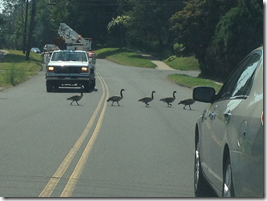Today is my last day of summer vacation. Tomorrow I will head back to school. It is a bittersweet time for teachers. Another summer has come and gone, faster than we can believe, and while most of us wish that our summer days would never end, we are also returning to a profession that we love with all our hearts.
Sadly, the first two days of every school year are consumed with meetings. My students don’t arrive until Wednesday morning, making the beginning of school especially difficult.
I love to teach. I despise meetings.
As my school year begins, I can’t help but think that I am returning home after a summer abroad. After fifteen years of teaching, my school has begun to feel more than a little like home. It has become a fixture of my life, and during my years spent teaching, I have worked and continue to work among people who have become some of my closest and dearest friends.
I have taught children who return to my classroom on a weekly basis to apprise their former teacher about their adventures in middle and high school. As they grow older, some of these students have become friends. I play basketball with them, counsel them on difficulties that they are experiencing and share in their accomplishments. Some of my former students now babysit my children and attend important family events with us. It’s something I could’ve never imagined when I began teaching so long ago.
I have also developed friendships with the parents of some of my former students, and these friends have become some of the most important people in my life. I count many of them as my best and closest friends. One is my daughter’s godmother, and two others are my son’s godparents.
Recently, I came to realize that some of the most important events of my life have taken place inside the walls to my school.
On September 11, 2001, I watched the second plane strike the World Trade Center and the both towers fall on a television in my principal’s office. Immediately thereafter, I retrieved my students from music class and went on with my day without telling them that anything had happened, giving them a few more precious hours of normalcy in a world that had suddenly changed.
In the fall of 2002, I met my future wife in the first staff meeting of the year. Ironically, our first real conversation would take place a few weeks later at a YMCA camp as we hiked around the lake with students and discussed the plans for her upcoming wedding, an engagement that she would later break off.
In the fall of 2004, I revealed plans to ask Elysha to marry me to a colleague and friend in our Curriculum Specialist’s office. A month later, while Elysha was trapped in an after-school meeting, a committee of teachers and friends helped me choose Elysha’s engagement ring. During the next month, I would hatch my plan to ask her to marry me in the principal’s office with several friends who were instrumental in pulling off the surprise.
In the spring of 2005 Elysha and I would knock on the door of our principal’s office after school one day and ask him to marry us on our wedding day.
That same spring, I received a call from the veterinarian before school informing me that my dog required life threatening spinal surgery. I went on to teach for the rest of the day while Kaleigh was in surgery, waiting to hear if she was alive or dead.
In the winter of 2006 I found a set of golf clubs in the back of my truck in the parking lot of my school, tied together by a thin, red ribbon. They were a gift from a friend and colleague. That set of used irons, which he had purchased for $10 at a yard sale, began my long and joyous road to golf mediocrity.
In February of 2007, I was sitting at the desk in the principal’s office when my aunt told me over the phone that my mother was dead. I spent a few moments alone before returning to class to finish the day with my kids.
In May of 2007, I received a call while teaching from a member of Human Resources, instructing me to come to his office immediately. That phone call and the subsequent meeting led to nearly a year of turmoil and terror that included an anonymous conspiracy to destroy my career (as well as the careers of my wife and friend), a large-scale attempt at character assassination and public defamation, a legal battle over my First Amendment rights and the unexpected and overwhelming support of the community.
In the fall of 2008 I was sitting at my desk when a call came in from the geneticist, informing me that I was a carrier of the muscular dystrophy gene, and that I was almost certain to contract the same disease that killed my mother.
That same year, I was sitting at the same desk when I received the call from my agent informing me that Random House had made a preemptive offer on my first novel. I spent a moment collecting myself before finding Elysha alone in the hall and informing her of the news. She collapsed to the floor in tears, sparking great concern throughout the faculty that something terrible had happened (and that perhaps I had broken up with her). I was standing by the library after the school day had ended when negotiations over the book had finished and the call came in with the final purchase price.
In the spring of 2010, a student teacher and I had a conversation while on recess duty that gave me the idea for my third novel, Memoirs of an Imaginary Friend. The book that I didn’t want to write and thought would be stupid was born on my school’s playground and has now been published in more than 20 countries around the world.
With experiences like these, and so many more, is it any surprise that a school can begin to feel like a home?
I can’t help but wonder: Does this happen to everyone at the workplace, or is there something different about working in a school?
Updated from a post originally written in 2010.


















